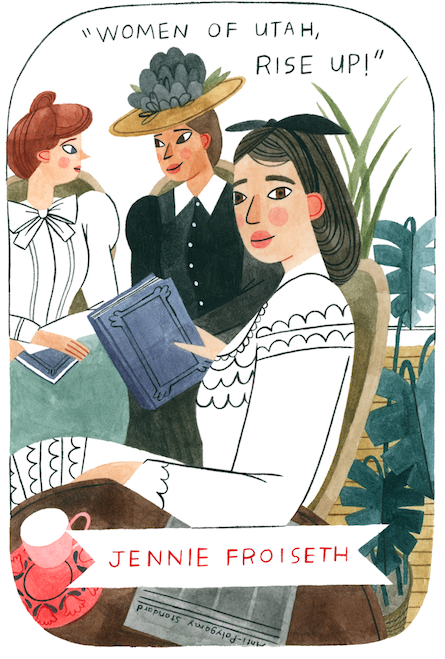
Additional Resources
Jennie Froiseth,
A Passionate Suffragist and Anti-Polygamist
1843 - 1930
“Women of Utah, rise up!”
By Ami Chopine and Rebekah Clark
As one of the most prominent non-Mormon women in early Utah, Jennie Froiseth struggled to strike a balance between her commitment to women’s suffrage and her passionate opposition to polygamy. An energetic activist, club woman, and philanthropist, she left a lasting influence on the experience of Utah women in the late nineteenth century.
Born in Ballyshannon, Ireland on December 6, 1843 [1], Jane “Jennie” Anderson immigrated to New York as a young child. She enjoyed the society of renowned journalists, writers, and political personalities in the East and while traveling extensively in Europe before accompanying her brother to Utah in 1870. There, Jennie met and married Bernard Froiseth, a former Civil War officer and well-respected surveyor. They had five children. At Rose Cottage, the home he built for her in Salt Lake City, Jennie hosted national celebrities, held women’s meetings, and founded influential organizations.[2]

Jennie Anderson Froiseth from her book, Women in Mormonism
Well-educated and refined, Jennie charmed Salt Lake City’s small “Gentile” social circles but felt intellectually and socially isolated by the lack of organized opportunities for non-Mormon women. Inspired by her connections and the culture of women’s clubs in the East, she founded the first literary women’s club in Salt Lake City in 1875. This exclusive non-Mormon club was christened the Blue Tea by Julia Ward Howe, Jennie’s friend and prominent national suffragist and poet. The Ladies Literary Club, still in existence today, is an outgrowth of this early society. The Blue Tea, which met weekly in Jennie’s parlor to research and discuss historical and literary topics, established powerful connections among non-Mormon women in early Utah and laid the organizational foundation for the anti-polygamy movement in Utah.
Her zealous opposition to the Mormon practice of polygamy led Jennie and other members of the Blue Tea to organize the Ladies’ Anti-Polygamy Society of Utah in 1878. She served as the society’s vice president and as the editor of the Anti-Polygamy Standard newspaper, which provided a contrasting view to the Mormon Woman’s Exponent. She traveled around the country lecturing, selling subscriptions to her paper, promoting the exposé she authored, and establishing additional chapters of the Anti-Polygamy Society. Through her efforts, women across the nation signed petitions urging the government to pass legislation to end polygamy.
Jennie was both an effective opponent of polygamy and an ardent proponent of the principle of women’s suffrage, but these roles often came in conflict. A committed suffragist, she was one of three delegates from Utah at the National Woman Suffrage Association (NWSA) convention in 1884 and served as an officer in the national organization from at least 1884 through 1888 as the NWSA vice president representing Utah.[3] Jennie had a complicated relationship, however, with many of her fellow suffragists. Although she advocated for suffrage in principle and publicly opposed the disfranchisement of all Utah women, she argued that Mormon women should not have the vote until the eradication of polygamy.[4] Following disfranchisement in 1887, Emmeline B. Wells and Emily S. Richards approached Jennie to seek her help, as the NWSA vice president, in organizing the new Utah chapter of the suffrage association. Jennie refused to participate, saying that “the idea of woman suffrage in Utah” was “repugnant to Gentile [non-Mormon] women” because of the “anomalous condition of affairs” created by polygamy.[5]

Jennie Anderson Froiseth. Courtesy of Utah State Historical Society.
After polygamy was officially abandoned by the LDS church in 1890 and Utah secured statehood and women’s suffrage in 1896, Jennie continued to advocate for the advancement and protection of women. She began to work with her former rival editor, Emmeline B. Wells, to organize women in the newly founded Republican party of Utah. She also supported the Orphan’s Home and Day Nursery, which offered daycare for working women, and helped establish and preside over the Sarah Daft Home, which continues today as a home for the elderly.[6] Jennie Froiseth passionately fought for the rights of women and dedicated her life to helping women embrace their social and civil powers.
Ami Chopine is a writer and currently a student of history at Utah Valley University. She lives with her husband and four children in South Jordan, Utah.
Rebekah Clark is Historical Director for Better Days. She holds a law degree from J. Reuben Clark Law School and a bachelor’s degree in American History and Literature from Harvard University, where she wrote her honors thesis on Utah’s participation in the national women’s suffrage movement.
For more on the Ladies’ Anti-Polygamy Society of Utah and the effect it had on Utah women’s suffrage, check out this fantastic article by our intern Gabi Price.
Footnotes
[1] This birthdate was given in Jennie’s passport application of June 22, 1866 and it differs from the date (1849) she gave later in Utah, which stayed with her the rest of her life. It was not unusual for women of the time to claim to be younger. “U.S. Passport Applications, 1796-1905,” s.v. “Jane Anderson,” (born 6 Dec. 1843), digital image available at Ancestry.com.
[2] “Fond Memories Cluster about Rose Cottage,” Salt Lake Tribune (September 14, 1913).
[3] National Woman Suffrage Association: Report of the Sixteenth Annual Washington Convention (Rochester, N.Y.: C. Mann Press, 1884), 141.
[4] Jennie Froiseth Anderson, “Disfranchising Utah Women,” Woman’s Journal 15 (June 14, 1884), 198.
[5] “The Sister Suffragists,” Salt Lake Tribune (January 8, 1889) 4; “The Gulf Between Them,” Salt Lake Tribune (January 11, 1889) 2.
[6] “Pioneer Dies,” Salt Lake Telegram (February 8, 1930).

